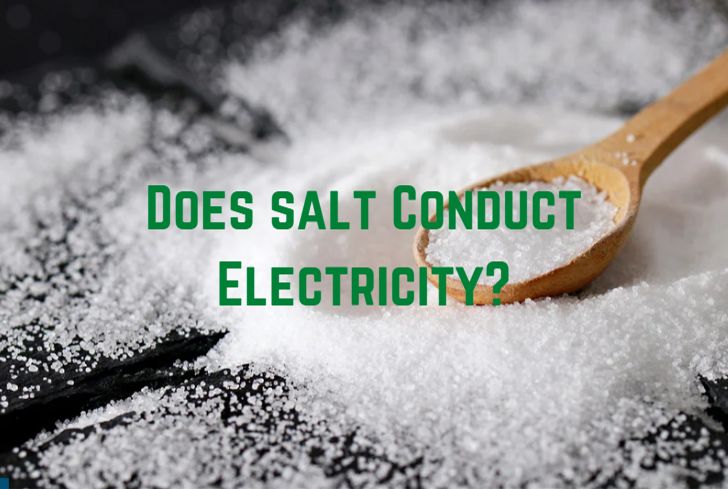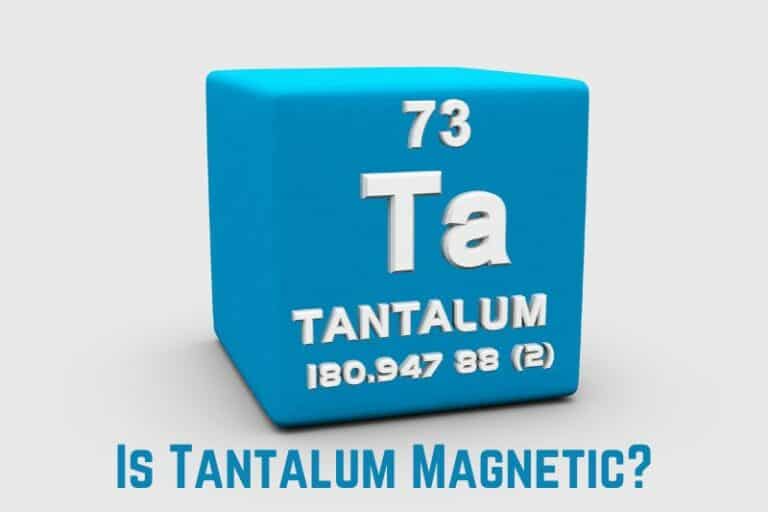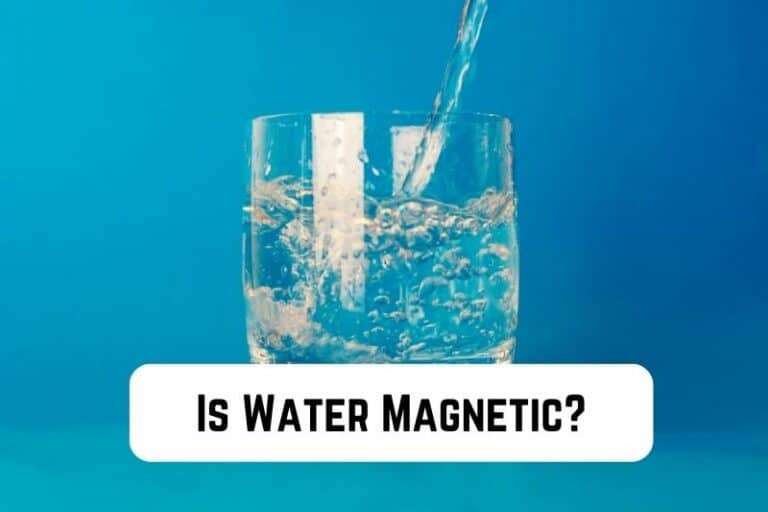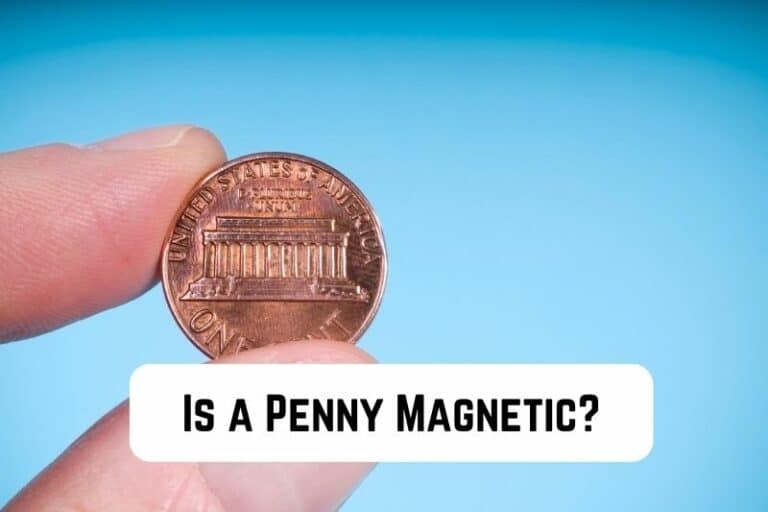Does Salt Conduct Electricity? (Answered)

When your food lacks salt, it doesn’t taste nice. Have you ever considered whether regular table salt has other properties and uses than enhancing food flavor? Does salt, for instance, conduct electricity?
We will answer various questions in this article, including that one. If table salt, salt water, molten salt, or solid salt conducts electricity, we will inform you of this. It would be beneficial to know whether salt conducts heat and whether it still conducts electricity when dissolved in water.
Read: Does Brass Conduct Electricity?
Is Salt Conductive?
Salt in its solid state does not conduct electricity. Salt includes ions, which function as charged particles, but the ions are not free. The lattice structure traps the ions, preventing them from moving freely and conducting. Strong inter-particle forces are used to bind the ions together. They are unable to carry an electric charge in this solid state.
Each sodium atom is linked to a chlorine atom in salt (sodium chloride). As a result of the chlorine atom receiving an electron from the sodium atom, the chlorine atom has a slight negative charge. In contrast, the sodium atom has a slight positive charge. An ionic bond is what results from this process.
The electrons cannot break free due to the strength of the ionic bond.
Does Salt Water Conduct Electricity?
Electricity does conduct in salt water. Sodium chloride is the name for table salt in its solid form. In water, sodium chloride dissolves and separates into sodium (Na+) and chloride (Cl–). The two charged ions have unrestricted movement in their soluble condition. Ions travel freely and carry a charge that is capable of conducting electricity.
When electrodes are added to the saltwater solution, positive and negative ions travel to the positive and negative electrodes. Electric current can pass freely through salt water thanks to the ions’ unrestricted migration to the opposing ends of the electrodes.
Electricity in saltwater is conducted according to the law of attraction between opposing charges. The negative chlorine ions are drawn to hydrogen, a positive terminal when salt dissolves in water. The sodium ions are drawn to oxygen in the saltwater because it functions as a negative terminal.
The saltwater solution has to form a stable ionic compound. Hence, the sodium atom donates an electron to chlorine.
Why Does Salt Conduct Electricity?
Chlorine and sodium make up solid salt. One free electron is held by sodium atoms, which readily give it up to form a positive ion. Contrarily, chlorine is always ready to accept one electron to become negatively charged because it needs one more to finish its outer shell. The sodium electrons won’t be free to migrate when it’s solid.
However, as solid salt melts or dissolves, the situation changes. The sodium electrons are free to receive now that the chlorine electrons are free to move. The likelihood of electrical conductivity arises when the electrons are in motion.

Does Table Salt Conduct Electricity?
Sodium chloride, referred to as table salt or NaCl, is an insulator that does not carry electricity. For salt to conduct electricity, its ions must be free to move. Solid salt ions cannot freely move because they are bonded in a lattice, which prevents them from conducting electricity.
Read: Is Tungsten Conductive?
Does Molten Salt Conduct Electricity?
Molten salt conducts electricity. When sodium chloride (table salt) is heated, the salt molecules separate into ions. After that, the ions can conduct electricity. Only at 1474° F (801° C) can sodium chloride melt and become a liquid. Molten salt is stable and flows like water. It conducts electricity the same way it would if it were dissolved.
You can obtain fused salt, also known as molten salt, by melting sodium chloride at a red-hot temperature. Although molten salt has the same heat capacity as water, it freezes back into a solid mass when it contracts, unlike water. So, only when molten salt is liquid does it conduct electricity.
Atoms of chlorine and sodium are reactive in molten salt. Because sodium is so electropositive, it is always prepared to donate electrons. Chlorine is always willing to accept an electron because it is electronegative. Because of this, once the electrons in molten salt are free to flow, they conduct electricity with no difficulty.
Molten salt has applications in the following industries because it conducts electricity.
- Molten salt produces most non-ferrous(non-iron) metals, such as aluminum and titanium.
- Fuel cells can directly use carbon-containing fuels( methanol, gasoline) in electricity production.
- They are used to strip metals clean of impurities.
Does Solid Salt Conduct Electricity?
Solid salt does not conduct electricity. A material must allow its charged particles to move freely within it for it to conduct electricity. Salt is made up of charged particles; however, they cannot move freely. Electrostatic forces, however, imprison the ions when the salt is solid. Salt cannot conduct electricity because the charged particles are not allowed to move freely.
Is Salt a Conductor of Heat?
A saltwater solution, unlike solid salt, is a heat conductor. Ions in saltwater that come from the dissolved solid salt, an ionic substance, allow it to transmit heat. Salt dissolves into ions, which function well as charge carriers. Heat can be absorbed by salt while it is liquid or molten.
The temperature at which salt becomes a liquid is 1473.4°F (800.8°C), which is the melting point of salt. The salt vaporizes at a temperature of 2669°F (1465°C), which is its boiling point. You can note that for salt to absorb enough heat to change a phase, it must have high temperatures. Hence salt in its solid state is a poor heat conductor.
However, as solid salt melts or dissolves, the trapped ions get free and vibrate, generating heat. Because salt absorbs heat, it lowers the freezing point of ice and water. The increase in global warming is due to salt water having distinct absorption characteristics and absorbing more heat than fresh water.
Read: Does Titanium Conduct Electricity?
Does Salt Conduct Electricity When Dissolved in Water?
When dissolved in water, salt can conduct electricity—water functions as a polar molecule. The negative end (oxygen) attracts the positive sodium ion, whereas the positive end (hydrogens) attracts the negative chlorine ion. Positive and negative ions now float freely after being separated from the salt molecule. When the salt molecule has split, its electrons can move freely, conducting electricity.
Na+ and Cl- ions make up the ionic solid known as salt. Pure water and salts in their solid states are both poor electrical conductors. The ions in salt become mobile and can carry an electric current when the salt is dissolved in water.
In water, ionic compounds like salt split into charged ions and are attracted to the electrode with opposite charges.
Frequently Asked Questions
Why doesn’t sugar solution conduct electricity while salt does?
Since its ions are free to move, the salt solution conducts electricity. When sodium is dissolved in water, chlorine, and sodium ions are produced. While conducting electricity, the positive sodium ions migrate to the negative electrode, and the negative chlorine ions move to the positive electrode.
On the other hand, water dissolves sugar to create sugar molecules. The sugar molecules cannot migrate to the opposite ends of the electrodes, like the salt ions, because they are neutral and uncharged.
Can deionized water conduct electricity?
Deionized water is water that has had its dissolved ions removed or exchanged by chemists through a method called ion exchange. When water is devoid of ions, it is unable to conduct electricity. Ions can move through the water while naked electrons cannot. Therefore, only ions in water can enable water to conduct.
Can salt water power a light bulb?
Yes, the bulb will light up when the electrodes are submerged in salt water because the salt has released ions that act as a carrier for the passage of power. You have a closed circuit when the battery is connected and the electrodes are in contact. From the battery’s positive terminal to its negative terminal, electrons flow. The flow is what makes the bulb glow.
But how much current travels through the circuit and even how bright the bulb lights depends on how much salt is in the saltwater. When you use regular water the light bulb won’t light since there is no medium to conduct electricity.
Is saltwater magnetic?
In the presence of an electromagnet, saltwater’s strong conductivity causes it to generate a moving magnetic field. The magnetic field that the saltwater produces induces irregular fluctuations in the water’s pressure and flow rate. Ions move through the metal to stabilize and create an electrical field when a charged magnet comes into contact with salt water.
Freshwater, on the other hand, is slightly diamagnetic, which means that a magnetic field repels it. An induced magnetic field in the opposite direction of the applied magnetic field results in a repulsive force.
Conclusion
Salt can only carry electricity when it is molten or liquid in nature. For this reason, do not attempt to place an electrode in a bowl of salt and wait for an electric current to flow. Be cautious to prevent an electric shock if you decide to test it out in a bowl of dissolved salt.






